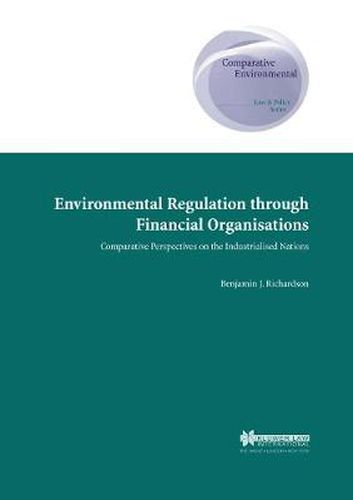Readings Newsletter
Become a Readings Member to make your shopping experience even easier.
Sign in or sign up for free!
You’re not far away from qualifying for FREE standard shipping within Australia
You’ve qualified for FREE standard shipping within Australia
The cart is loading…






This title is printed to order. This book may have been self-published. If so, we cannot guarantee the quality of the content. In the main most books will have gone through the editing process however some may not. We therefore suggest that you be aware of this before ordering this book. If in doubt check either the author or publisher’s details as we are unable to accept any returns unless they are faulty. Please contact us if you have any questions.
This volume examines in the industrialized nations the emerging role of banks, insurers and institutional investors as organisations for articulating and strengthening environmental law and policy. Taking a comparative perspective of practice in the European Union, North America, Japan and Australasia, the book argues that existing legal reforms to promote sustainable development are unlikely to be successful unless environmental policy can be diffused and embedded in the financial services sector. This sector plays a crucial role in creating the financial conditions that allow much economic development to proceed. Financial markets are already highly regulated in pursuance of various public policy objectives, and there is scope to adapt existing regulation to incorporate environmental aspects into the financial services sector. In terms of specific reforms, the book focuses on the role of corporate environmental reporting, economic instruments and liability rules to provide a proper context for engaging financial organisations with the environment, as well as reforms to the system of prudential regulation that currently governs this sector. Beyond the focus on the financial services sector, the book raises complex questions regarding the relationship between the state and market institutions in environmental policy, and should appeal to scholars from a wide range of disciplines interested in problems of environmental governance.
$9.00 standard shipping within Australia
FREE standard shipping within Australia for orders over $100.00
Express & International shipping calculated at checkout
This title is printed to order. This book may have been self-published. If so, we cannot guarantee the quality of the content. In the main most books will have gone through the editing process however some may not. We therefore suggest that you be aware of this before ordering this book. If in doubt check either the author or publisher’s details as we are unable to accept any returns unless they are faulty. Please contact us if you have any questions.
This volume examines in the industrialized nations the emerging role of banks, insurers and institutional investors as organisations for articulating and strengthening environmental law and policy. Taking a comparative perspective of practice in the European Union, North America, Japan and Australasia, the book argues that existing legal reforms to promote sustainable development are unlikely to be successful unless environmental policy can be diffused and embedded in the financial services sector. This sector plays a crucial role in creating the financial conditions that allow much economic development to proceed. Financial markets are already highly regulated in pursuance of various public policy objectives, and there is scope to adapt existing regulation to incorporate environmental aspects into the financial services sector. In terms of specific reforms, the book focuses on the role of corporate environmental reporting, economic instruments and liability rules to provide a proper context for engaging financial organisations with the environment, as well as reforms to the system of prudential regulation that currently governs this sector. Beyond the focus on the financial services sector, the book raises complex questions regarding the relationship between the state and market institutions in environmental policy, and should appeal to scholars from a wide range of disciplines interested in problems of environmental governance.